Pursuing a PhD is a once in a lifetime experience. Motivation and passion, while balancing mind and health, are key elements for success.
After graduating with a Master’s degree, going for work was my first option. I started my career in the automotive industry in 2016. I gradually realized that the technology trend in this field was undergoing big changes, such as electric vehicles, autonomous cars, etc. Advances in computer science and technology have played a crucial role in the advent of autonomous systems. As a technology amateur, I started to look at research as a new horizon for my career.

Figure 1. Digital technology (source)
In the following sections, I will first introduce the reasons why I started to pursue PhD research. I will then describe the doctoral programme, its added value and my personal contributions to it. Lastly, I will describe how I personally manage my research.
The decision to study for a PhD
Before starting my PhD, I had been working for 3 years as a software engineer in China. During that time, I gained thorough practical experience and enriched my knowledge and skills in the area of analytical thinking, trouble shooting, learning abilities, teaching skills, etc. However, at the end of this 3-year time span, I was questioning myself whether to continue my career in that specific field and become a manager, or go even further, by pursuing research and becoming a technical expert.

Figure 2. Project introduction to company
Thus, there were two career directions for me to consider: the first one was pursuing another job with better remuneration but where I would be dupplicating already accumulated work experience and knowledge. The second one was pursuing an interesting research path full with innovation and creation. I eventually decided to choose the second option that would provide long-term support and motivation in my career. At that time, I began to re-consider my initial thoughts about doing a PhD study as I had gained clear expertise in technology development within the automotive industry. Combining my personal abilities and industry understanding, I decided it was time to pursue PhD research with a more concrete goal in order to further extend my professional and technical expertise and advance my career.
Offer from the H2020-MSCA-ITN SAS programme
After several months of hard preparations and several rounds of strict selections, I was honored to be selected as an ESR (Early Stage Researcher) of the SAS project funding under the well-known Marie Skłodowska-Curie actions.
Here, I would like to briefly present the H2020-MSCA-ITN SAS programme:
Firstly, the MSCA funding (Marie Skłodowska-Curie actions) provides grants for all stages of researchers’ careers, and its aim is to equip researchers with the necessary skills and international experience for a successful career.
The MSCA scheme has several types of funding, and ITN (Innovation Training Networks) is one of them. ITNs support competitively selected joint research training and/or doctoral programmes, implemented by European partnerships of universities, research institutions, and non-academic organisations. In my case, I work at Fraunhofer ESK institute for my PhD research, and Institute LAAS-CNRS and company Bosch are also co-partners to conduct my research.
The Project, Safer Autonomous Systems (SAS), aims to identify ways we can establish people’s trust in autonomous systems by making these systems demonstrably safer and more reliable.
Overall, the MSCA-ITN SAS programme is based on the Horizon-2020 plan which is the EU framework Programme for Research and Innovation.
Gains from the MSCA programme
I started my PhD studies in July 2019. One of the first essential steps was to read a lot of papers in order to better delineate the scope of the research. However, without a rigorous study methodology, research can not be effectively carried out. Within this period, my supervisor and group manager provided me with a lot of support on research methodology, including ways to better delineate the subject and better define the contribution points, etc.
Furthermore, the resources of the institute and the MSCA programme have provided me with the chance of apprehending and critically assessing the state-of-art in the field of autonomous systems. For instance, I was able to identify the main research trends, assess the research bottlenecks and lacuna, identify new research topics, just to name a few.
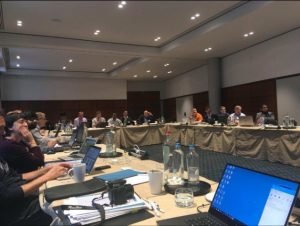
Figure 3. SAS Kick-off meeting
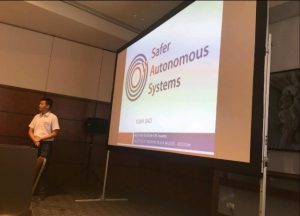
Figure 4. SAS Kick-off meeting
What’s more, the Marie-Curie programme is a valuable platform for all ESRs to practice and enhance their soft skills as well as broaden their mind. It encourages them to deliver presentations during workshops, conferences, provides them with the opportunity of carrying out secondments and gives them the chance to do research outreach and dissimination.
Last but not least, the SAS programme’s tight schedule encourages all ESRs to optimize their time management and enhance their self-management.
Contributions to the MSCA programme
Usually, ordinary PhD programmes only focus on research, while the MSCA scheme requires more social responsibilities and missions from ESRs. Although research is the main component, outreach activities are also an important element to judge the ESR’s overall performance during their research.
Currently, our ESRs have organized the outreach activities to promote the SAS programme by using social media like LinkedIn, Facebook, Twitter and the website’s Blog. Our aim is to publicize the SAS project as much as possible by making people aware of our research and highlighting current technology trends.
The following pictures is showing our current outreach activities:
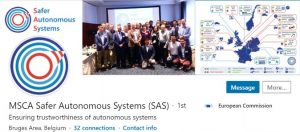
Figure 5. LinkedIn web page
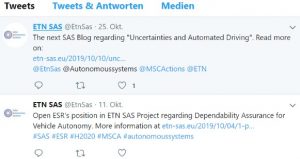
Figure 6. Twitter web page
Tips in PhD studies
It is often heard that carrying out a PhD study is a stressful task. For instance, you need to read large quantities of papers only to find a few relevant to your research field. You need to build strong self-management abilities for your research to be successful. You need to develop project management skills, and you need to wait for the acceptance of a publication, etc. I would not deny these facts but I would rather choose a different way to think. In my opinion, a PhD study should be done out of interest for the subject and a strong will to find solutions and contribute to research. Without these elements, the PhD would be a long and difficult journey…
Currently, research and regular physical activities are two key elements that balance my life as a PhD student. I find this ‘mind and health’ balance allows me to improve my work efficiency and health. When I am not working at the institute, the university library is my second work place, as the quiet atmosphere makes for a calm study environment. Moreover, this allows me to continuously iterate my knowledge (Agile style).
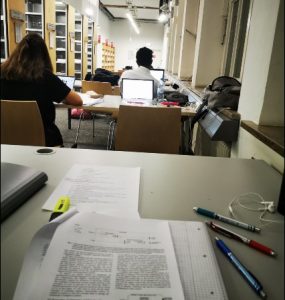
Figure 7. Study in library

Figure 8. Exercise in gym
As a conclusion, I would like to say that pursuing a PhD is a one in a lifetime experience. Motivation and passion are key elements for success.
About the Author: Yuan Liao
 Yuan, majoring in embedded systems, obtained a dual master’s degree at ESIGELEC in France and USST in China in 2016. Then he started 3-year work as a software engineer in the field of automotive. He accumulated experiences in the field of software engineering and is interested in further researching in this field, which drove him for pursuing the PhD. Here he will carry out research in the area of autonomous systems to study the implementation of an adaptive platform for safer autonomous systems in the industry.
Yuan, majoring in embedded systems, obtained a dual master’s degree at ESIGELEC in France and USST in China in 2016. Then he started 3-year work as a software engineer in the field of automotive. He accumulated experiences in the field of software engineering and is interested in further researching in this field, which drove him for pursuing the PhD. Here he will carry out research in the area of autonomous systems to study the implementation of an adaptive platform for safer autonomous systems in the industry.


